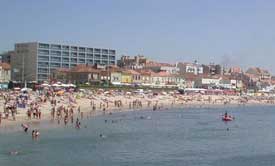Origins of holidays
Originally, resting days were given by religious festivities or natural cycles. While the pop
 ulation was mostly rural, the main resting period (that coincided generally with the celebration of festivals) was after the harvest time, in a period varying from August to December.
ulation was mostly rural, the main resting period (that coincided generally with the celebration of festivals) was after the harvest time, in a period varying from August to December.The first journeys due to celebrations were pilgrimages to religious centres (Oracle in Delphi, Mecca, Temple of Mahabodhi, Way of St James, etc), or cultural events, such as the Olympic Games, and were made very few times a life. It was already common in these journeys to bring "souvenirs" back home. In the end of the Middle Age the first establishments known as "hotels" appear, created to accommodate important people who traveled with their entourage. Rich classes, moreover, used to have a villa or palace as alternative residence, often near the sea, where climate was mild. Some places were starting to stand out such as Baiae (Italy) during the Roman Republic.
Modern Age: English-like tourism
It is during the 16th Century that the interest of travelling and exploring new places. In England it becomes fashionable among the aristocracy to send the young men for a "Grand Tour" (from there came the word "tourist") during several years in order to complete their stu
 dies and have new experiences. At this time also baths are reborn (now as bath centres far from cities) and beaches, where first the English Royal Family moved (Weymouth, Brighton, etc.) and then spread among rich people, just for imitating. The renewed interest in topics such as Botanics, Archeology or Paleontology gave way to interest of hiking during the months in Spring and Summer.
dies and have new experiences. At this time also baths are reborn (now as bath centres far from cities) and beaches, where first the English Royal Family moved (Weymouth, Brighton, etc.) and then spread among rich people, just for imitating. The renewed interest in topics such as Botanics, Archeology or Paleontology gave way to interest of hiking during the months in Spring and Summer.The 19th Century witnesses the revolution in transports and the apparing of railway lines and transoceanic boats that make long journeys easy and cheap for the new burgeoisie, less elitist than ancient aristocracy, and also with time and money to spend. Health tourism is generalised, and beaches are joined by mountain: it is the time of
It was also the English who, looking for a new leisure season, started Winter tourism in the Swiss villages of Zermatt and St Moritz in 1864, where the first ski resorts. This fact coincides (not by chance) with the invention of modern skiing by Sadre Norhein (1825) and his technique of "telemark".
Modern Tourism
Since the 1950s the "boom" of tourism in Western World takes place, thanks to political stability, elevation of standards of living, generalisation of cheap automobiles and ur
 banisation of society (that generates a new culture of leisure based in fleeing from stress of daily life). It is also then when tourism becomes massified: first the vehicle trip to the seaside, and then, when the reaction airplane appears, tourism packs to exotic destinations. During the 1960s all the aspects of tourism are legislated (insurances, rights of passengers, paid holidays).
banisation of society (that generates a new culture of leisure based in fleeing from stress of daily life). It is also then when tourism becomes massified: first the vehicle trip to the seaside, and then, when the reaction airplane appears, tourism packs to exotic destinations. During the 1960s all the aspects of tourism are legislated (insurances, rights of passengers, paid holidays).
Modern tourism dates from the 1980s, when it becomes diversified in many different types (cultural, rural, health, risk tourism), characterised by the liberalisation and internationalisation of the big tourism companies and the free exchange of people inside the European Union. Also recently appears the backpacker, a kind of independent tourist with few resources, and also low-cost flight companies. These are lately generating a new conception of tourism based on do-it-yurself and freedom, in a World where individuals have already enough education and power to do so.




